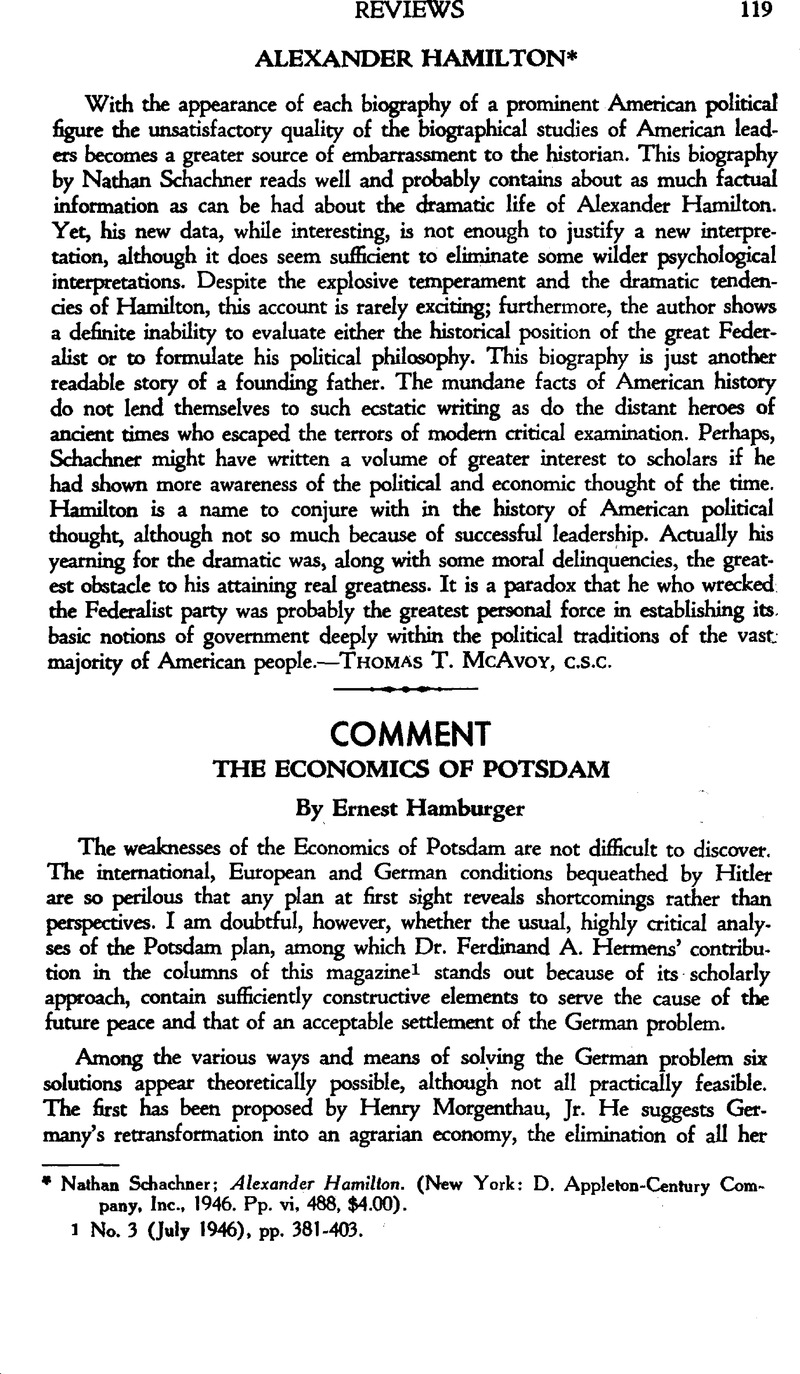No CrossRef data available.
Article contents
The Economics of Potsdam
Published online by Cambridge University Press: 05 August 2009
Abstract

- Type
- Comment
- Information
- Copyright
- Copyright © University of Notre Dame 1947
References
page 119 note l No. 3 (July 1946), pp. 381–403.
page 122 note 2 “The Economic Problem of Germany” in Social Research, New York, (06 1946), pp. 135–182Google Scholar; (also published among the Occasional Papers of the Institute of World Affairs, New York).
page 124 note 1 Social Research, July, 1946.Google Scholar
page 124 note 2 Johnson, Alvin, “Two Sides of the German Problem,” The Yale Review, Autumn, 1946.Google Scholar
3 The Potsdam declarations authorize the occupation authorities to arrest—without habeas corpus, or assurance of trial—not only Nazis, but “any other persons dangerous to the occupation or its objectives.”
4 Adams, Roger, Chairman, Board of Directors of the American Chemical Society in “The Future of German Industry,” Chemical and Engineering News, September 25, 1946, p. 2488.Google Scholar
5 This was pointed out in a very informative article by Lorentz, Ernest F., entitled “Reparationen-ein Schluessel zum europaeischen Unfrieden,” Staatszeitung and Herold, August 25, 1946Google Scholar. The same author has dealt with other aspects of the subject in articles published in the Staatszeitung between July 28 and November 17. —Attention should also be drawn to the careful exposure of Mr. Morgenthau's political and economic fallacies in a series of articles by “Diplomaticus,” published in the Staatzeitung between October 28 and December 30, 1945.
6 “The Economics of Potsdam,” THE REVIEW OF POLITICS, July, 1946, pp. 396–8Google Scholar. From the point of view of economic theory, the crucial problem lies in the use of the “method of variation” (p. 396)Google Scholar. It is characteristic of Mr. Hamburger's approach to the matter that he does not even consider this problem. Without a satisfactory answer to this question, however, his statistics lack a rational basis.
7 Op. cit., p. 42.Google Scholar
8 When speaking of “progressively minded experts on German agriculture” whose views he considers to be opposed to mine, Mr. Hamburger apparently thinks principally of Dr. Karl Brandt, the internationally-known expert on agricultural economics of Stanford University. Mr. Hamburger would have done well to enquire from Mr. Brandt whether the latter approves of the use made of his publications in “The Economic Problem of Germany,“ pp. 138ff.Google Scholar To me, Hamburger's interpretation of Brandt's material was amazing, and there is reason to believe that Mr. Brandt's reaction was similar.
9 Hermens, F. A., “Potsdam or Peace: The Choice Before Us,” Human Events pamphlet for December, 1946.Google Scholar
10 The Gates of Mercy, issue of December, 1945.Google Scholar
11 For example, in my book. The Tyrants' War and the Peoples' Peace (Chicago, 1944), p. 181.Google Scholar
12 The German Settlement, issue of August 11, 1945.Google Scholar




